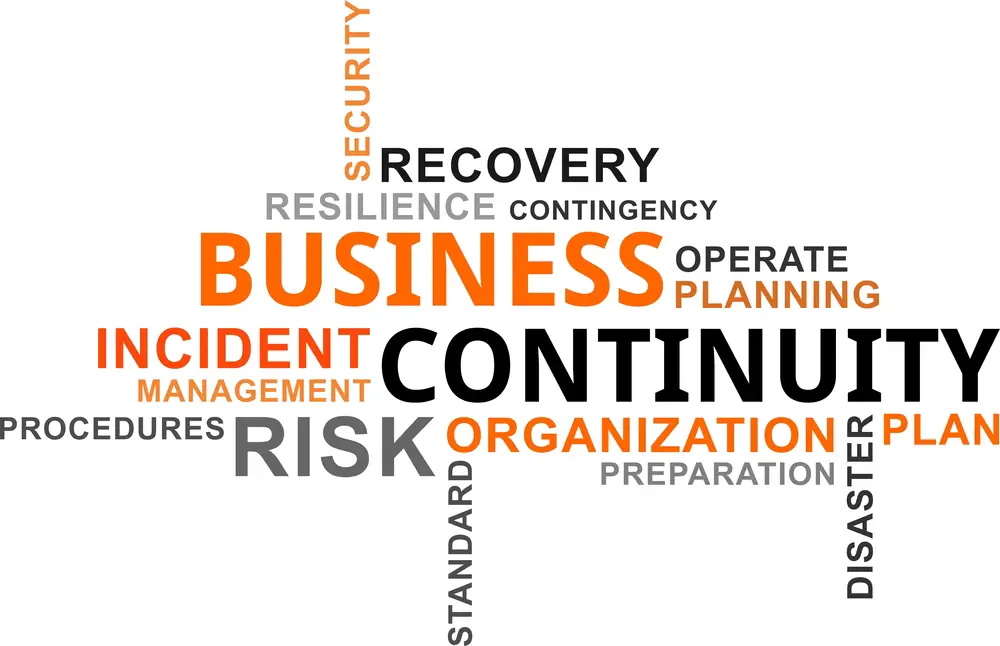In today’s digital world, businesses must be prepared for any type of disruption. A business continuity management system (BCMS) can help minimize the impact and keep operations running smoothly, whether a natural disaster, technical outage, or other unforeseen events.
Organizational leaders realize that business continuity planning is important as pandemics hit businesses across all continents. Business continuity plans provide numerous benefits to a company in a crowded environment, often overlooked by governmental authorities or businesses operating in emergency situations.
Protect the supply chain.
Business continuity plans capture critical operations that need minimizing and recovering. Often business operations are disrupted because of these problems. Implementing business continuity plans helps stakeholders to take the necessary steps to ensure critical operations are planned.
It enables a business to keep up with all processes, provide its products within a specified period, and deliver products to its customers at their best.
Preserve brand reputation
In the long term, the importance of ensuring optimum brand image in the market has always been paramount. Besides improving customer loyalty, it also helps in generating sales revenue. A business continuity program is essential for creating trust, providing stability in crisis situations, and achieving customer expectations.
Continued product excellence
Whenever a firm executes its business continuity plan correctly, it is possible for emergencies to turn hemorrhages into hiccups. It is possible to manage a business operation smoothly while providing value for the customer and the vendor while maintaining the integrity of the business.
Product excellence is possible, however when the company develops and executes the right BCP in the context of the Risk Management program in the future.
Quality Control
In any critical situation, the company must ensure the highest levels of customer satisfaction so as not to lose customer loyalty to its brands. The business continuity plan helps the company preserve quality and replace the resources impacted by an emergency situation using technology and alternative infrastructure.
It focuses on quality products that prioritize customers’ requirements and maintains the brand reputation.
Risk management
Business continuity plans can help companies manage risks and improve business continuity. Because of the ongoing pandemic, many businesses lost revenue, and operations are interrupted due to the lockout.
Business continuity programs also help to mitigate any risk associated with a pandemic. Risk management and damage control initiatives also provide organizations with the tools to manage situations.
Disaster recovery
Disaster Recovery is important for businesses if they cannot recover operations from the disaster. Unexpected events can occur in many unusual situations. Businesses with strong business continuity programs have been known for surviving crises with success.
It’s, therefore, essential for businesses to include Disaster Recovery in their operations in emergencies.
Organizational assurance
Companies must ensure that all business stakeholders are protected when a crisis occurs. Businesses should comfort workers while communicating timely and maintaining a transparent view of the actual situations and the possible options available.
Clear communications are essential for employees coping with stress, which will reduce confusion.
Compliance with industry standards
Developing business continuity strategies helps ensure leadership follows business continuity requirements. The report enables organizations to check their compliance with industry regulations.
It also ensures that company operations are effectively carried out and demonstrates that organization knows about risk management strategies and other duties.
Reduced downtimes
Business continuity programs can be implemented to prevent business downtimes. The BCP helps businesses manage their business operations during emergencies and can help them with technical and human outage issues.

What is Business Continuity Management?
Business Continuity Management (BCM) is a process that helps organizations identify and mitigate risks to keep operations running smoothly. BCM involves identifying potential threats, implementing strategies to reduce or eliminate those threats, and testing the strategies to ensure they are effective.
It also involves developing plans for business processes and responding to and recovering from disruptions caused by those threats. BCM is important because it helps organizations minimize the disruptions caused by disasters, malfunctions, and other unexpected events.
Business continuity management is the process used by companies to identify potential risks and reduce them. It makes businesses stronger when they face an uncertain situation. Disruptions could impact information processing or both. Power is lost in stormy weather.
Benefits of Business Continuity Management System (BCMS)
BCMSs protect workers and their valuable assets from risks. The firm can continue to offer products or services through the use of human resources. The Company will therefore generate income and maintain its strong reputation for success.
Business Continuity Management Systems (BCMS) provide many benefits to organizations, including:
- Improved Disaster Recovery: BCMS helps organizations plan for and recover from disasters by identifying potential risks, preparing for disruptions, and developing resilient systems.
- Risk Mitigation: BCMS effectively identifies and mitigates threats that can cause disruptions or data loss.
- Improved Efficiency: BCMS enables organizations to run more efficiently by allowing them to develop contingency plans that allow operations to continue in the event of a disruption.
- Cost Savings: BCMS saves money by reducing the impact of unexpected events on an organization’s operations and productivity.
- Compliance: BCMS helps organizations meet industry standards and comply with regulations such as GDPR and HIPAA.
What is Business Continuity?
Business continuity relates to the continuity of operations of an organization even after a disruption or disaster. The organization must develop comprehensive plans to maintain normal operations in case of unexpected events like cyber attacks, natural disasters, natural fires, and power outages.
Businesses can quickly resume business operations after an unanticipated event using Business Continuous Planning (BCP). The value of maintaining business continuity plans cannot be underestimated.
What is a business continuity plan?
Business continuity plans can be incorporated into business continuity systems such as BCMs, which provide for procedures an organization must follow when an emergency happens. It also describes recovery steps within the days after the accident.
BCPs include a disaster recovery plan intended to ensure IT and technical continuity. Alternatively, an organization may follow specific steps and prepare the plan by employing an external consultant.
Importance of Business Continuity Plans
Strong business continuity plans will help the company maintain its goods or services while also earning income and can effectively reduce losses during a disaster or in an emergency. A widely used statistic states that nearly 40 percent of businesses fail after a disaster.
Although many people doubt the source of their problems, recovery is obvious for those who experienced massive disruption.
The importance of governance in business continuity management
Managing business continuity effectively is essential. Governance began with Business Continuity policies. The guidance from leadership ensures the plan will address new risk areas depending on the company’s business continuity strategy.
Despite this, many people don’t think the governance approach is always accurate. Traditional governance is focused on determining what your plans cover,” adds Fullick. It includes flooding, fires, earthquakes, tornados, and hurricanes.

Importance of Business Continuity to Small Business
Small businesses often believe that they are exempt from crisis situations. In fact, nearly half the reopening businesses fail within 3-5 years. Despite our fears, some people believe they won’t get here.” This calm and sane attitude cannot be defended after the Pandemic. For Tony Bombacino, business continuity is an everyday thing.
Previously, he co-founded Realfood Blends, a private company that creates a wide range of food products that can be taken from food tubes. I think about everything I don’t really think,’ he added, and thus creates a solid business continuity plan.
Importance of Business Continuity for the Supply Chain
A BCP can save inventory levels. A Business Impact Assessment (BIA) may help you understand the risk to the company’s ability to manufacture and deliver products in a crisis. Toyota’s plant in the United States demonstrates that a ruptured supply chain had closed production hundreds of miles away.
Following the 2011 earthquake in Japan, the Japanese automotive industry shut down. When Toyota could no longer produce parts from the plant, many of the company’s employees were forced to retire.
Importance of Business Continuity to IT
Most companies use technology to maintain or operate services such as the Internet and voice over IP (VOIP). The group carries documents and runs computers. Without IT, businesses are impossible. Therefore, IT’s Business Continuity Plans should be essential.
Importance of Business Continuity Planning in Crisis Management
Crisis management forms an important part of any reassurance plan. Business continuity offers holistic approaches to protecting human life and guarantees that crucial processes continue operating. Crisis Management is about communication and decisions.
Business continuity planning helps companies, nonprofits, and others outline steps to take during and after unexpected disruptions in operations
A business continuity plan exists to protect businesses against unexpected catastrophes and disruption. The creation of such a plan is critical for the company’s crisis planning because even the prepared company can suffer sudden threats.
It requires hard work and collaboration among the leaders and the board members. The detailed overview of important software and business continuity principles that can be used for successful implementation.
What should be included in a business continuity plan?
A comprehensive Business continuity plan provides roadmaps for the return to normal operations when disruptive events occur. Important elements of the business continuity Plan include:-
Important elements of a Business Continuity Plan include:
- Risk Assessment: Identifying potential risks that could disrupt operations.
- Strategies and Procedures: Develop strategies and procedures to reduce or eliminate threats.
- Crisis Management Protocols: Creating protocols for how to respond in the event of an incident.
- Testing & Validation: Testing and validating the plan to ensure it is effective.
- Communication Plan: Establishing a plan for communicating with staff, customers, vendors, etc., during disruptions.
Acceptable downtime
Acceptable downtime refers to how long an organization may tolerate critical software services and hardware availability. Providing an effective baseline to measure readiness for disruption is a critical consideration in business continuity plans.
When determining acceptable downtime, take into account factors including potential revenues lost as a result of lower availability, impact on customers and suppliers, operational costs associated with restoring service, public perception of an interruption in the service, legal liabilities related to the privacy law and any other risks that might arise from compliance issues.

Plan to maintain operations
Business continuity plans should contain operations plans in place to ensure success. This plan should describe steps taken by an organization in the event of an emergency. It should include specific steps to restore critical services, such as customer service departments.
IT infrastructure, supply chains, and detailed guidelines on where to continue to work remotely if needed to improve processes increase the company’s competitive advantage.
In addition to a comprehensive strategy, alternate resources and employees should exist for unplanned interruptions.
Conclusion
Business continuity management systems are becoming increasingly important as organizations strive for greater resilience in the face of unexpected disruptions or disasters. With a BCMS in place and disaster recovery plans, you can reduce risk and improve efficiency and brand value.
Business continuity helps increase visibility into all areas of your organization and ensures that your team is prepared for any business disruption. It’s an invaluable tool that should be part of every business’s risk management strategy.
Have you read?
Elements of a business continuity management systems
What is the main purpose of business continuity management
Purpose of a business continuity plan
Why business continuity management system?

Chris Ekai is a Risk Management expert with over 10 years of experience in the field. He has a Master’s(MSc) degree in Risk Management from University of Portsmouth and is a CPA and Finance professional. He currently works as a Content Manager at Risk Publishing, writing about Enterprise Risk Management, Business Continuity Management and Project Management.

